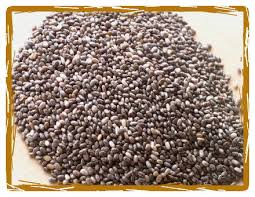A clinical study was done on overweight adults to determine the effectiveness of chia seed. The hypothesis of this study was that certain contents in chia seed would promote weight loss and improve risk factors for disease. The results of this study found no significant difference, meaning the hypothesis was rejected. Chia seed does not influence body weight or disease risk factors. This paper is supported by a scientific study and concludes that chia seed does not promote weight loss or alter disease risk factors in overweight adults.
This study consisted of 90 adult men and women ages 20-70. Due to the strict supplement regimen, only 76 participants completed. These participants were classified as overweight or obese (BMI of >25) and had no disease. The participants were randomized to either a chia seed supplement or a placebo seed supplement through a single blinded procedure. The seed was a 25g dose mixed in .25 L water and taken as a liquid supplement. The participants took the supplement twice a day on an empty stomach before meals. The results of this study showed no significant difference between the chia and placebo. Body Mass did not change in the 12 week period for the chia seed or the placebo: men time effect P=.112 and interaction effect P=.862, women time effect P=.471 and interaction effect P=.987. Body composition didn’t change either: men time effect P=.830 and interaction effect P=.474, women time effect P=.798 and interaction effect P=.146. Serum lipoprotein, glucose and CRP, systolic blood pressure, and plasma cytokine did not differ between the chia seed and the placebo either (P>.05). There was no significant difference in EPA and DHA (P=.420 and .980). Plasma ALA did however increase with chia supplementation (P=.012).
With these study results the author believes that, aside from the increase in plasma ALA, there is no health benefit in consuming chi seed vs the placebo when measuring body composition and disease risk factors. Strengths of this study include the fact that it is peer-reviewed and it appropriately concludes the results of the experiment. There are a couple of limitations to this study that should be addressed. This study is single blinded meaning there could have been bias when assigning the chia vs placebo supplement. The author also admits there was difficulty in creating a placebo with the same composition as chia seed. 41% of participants in the chia group reported that they thought they were on chia. 62% of the placebo group reported they thought they were on the placebo. This is statistically significant (P<.05) when comparing these group differences.
There have been other studies conducted on the benefit of chia seed, some showing similar results, some with slightly differing results. In a study conducted in North Carolina on postmenopausal women, ALA and EPA both increased significantly with the intake of chia, whereas DPA and DHA did not (1). In a study conducted on rats, the ALA in chia seed was shown to induce lipid redistribution, which helped with cardioprotection and hepatoprotection (2). Another study was conducted on rats as well, finding similar results. This study looked at the effect of chia seed on dyslipidemia and insulin resistance and found that chia can reduce dyslipidemia in sucrose-rich diet rats (3).
Chia seed is high in ALA which can ensure health benefits. However, chia seed won’t cure disease or lower disease risk factors. Chia seed can’t change body composition or weight.
Nieman DC et all. Chia seed does not promote weight loss or alter disease risk factors in overweight adults. PubMed. doi: 10.1016/j.nutres.2009.05.011
http://www.ncbi.nlm.nih.gov/pubmed/19628108
- F Jin et al. Supplementation of Milled Chia Seeds Increases Plasma ALA and EPA in Postmenopausal Women. Plant Foods for Human Nutrition. 2012;67(2):105-110 http://link.springer.com/article/10.1007/s11130-012-0286-
- H Poudyal et al. Lipid redistribution by a-linolenic acid-rich chia seed inhibits stearoyl-CoA desaturase-1 and induces cardiac and hepatic protection in diet-induced obese rats. JNB. 2012;23(2):153-162 http://www.sciencedirect.com/science/article/pii/S0955286311000088
- A Chicco et al. Dietary chia seed (Salvia hispanica L.) rich in a-linolenic acid improves adiposity and normalizes hypertriacylglycerolaemia and insulin resistance in dyslipidemia rats. British Journal of Nutrition. 2009;101(1);41-50
Reviewed by Viktoriya Wolff







